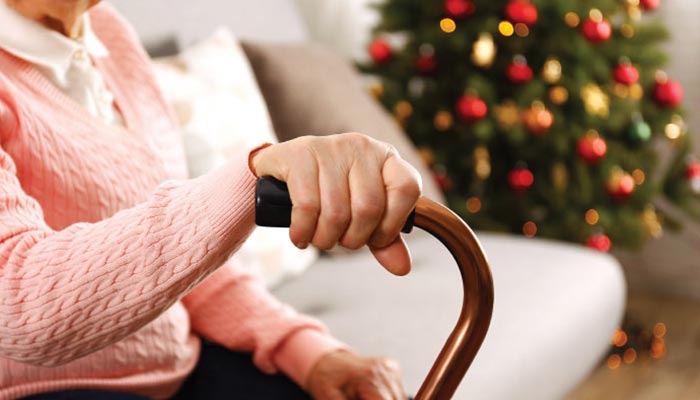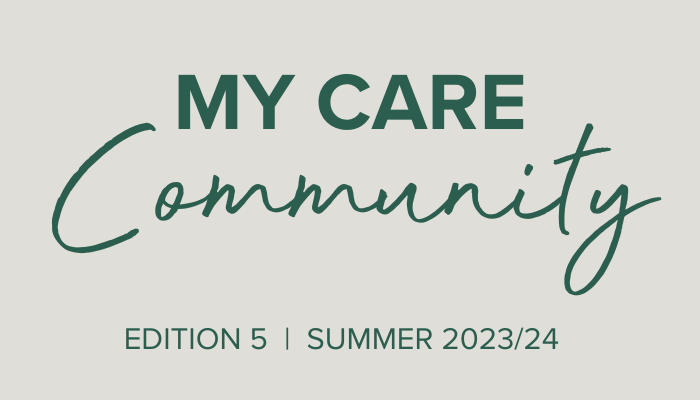The festive season has well and truly arrived. While COVID-19 may make our celebrations a little different this year (again), it is still the time of year when many of us will be spending time with family, getting together with loved ones we may not see often, and visiting family members who may live alone.
For older people, it is often small changes and minor problems that can be early warning signs of a potentially serious health issue. So, this Christmas, we’re encouraging families to gather safely – not just for the good food and company, but also to watch for subtle signs that an elderly loved one isn’t coping well at home.
Sign 1. An empty fridge and pantry
Take a quick glance over your loved one’s kitchen. Do they have access to wholesome and nutritious food? Are the cupboards stocked as they normally are? If not, it’s possible that your loved one is finding it harder to go grocery shopping. They might not have access to transportation, or they might lack confidence in their ability to travel to stores, navigate the aisles, and carry groceries because of their poor mobility or cognitive issues.
Sign 2. Loose summer clothing
Has your older loved one lost weight without trying? Are they enjoying their Christmas food or do they seem uninterested? Unintentional weight loss is a major red flag for doctors because it is frequently accompanied by malnutrition. If your loved one has lost a significant amount of weight, there could be underlying health issues that need to be diagnosed and managed, or it could be a sign that they require more assistance with daily activities.
Weight loss can also be caused by issues such as difficulty or pain with chewing and swallowing, forgetting to eat, having difficulty organising meal preparation or lacking the motivation to cook due to living and eating alone. It should be noted that a general rule of thumb is that unintentionally losing 5 per cent of one’s original body weight over 3-6 months is cause for concern.
Sign 3. Poor personal hygiene
Your loved one was always the most well-dressed person at the Christmas party. This time, however, you’ve noticed something isn’t quite right. They appear to have abandoned self-care. This could be due to a medical condition or simply a lack of interest in their appearance and surroundings. Changes in personal grooming habits can also be caused by memory trouble or physical ailments.
Sign 4. No visits from friends and family
Is your loved one getting out as much as they used to? Are they staying in touch with their friends and family? For a variety of reasons, including illness, injury, loss of driving ability, loss of mobility, lack of confidence, or bereavement, older people are at risk of social isolation. Good relationships with family and friends have intangible health benefits that should not be overlooked.
Sign 5. A messy home
Take a look around your loved one’s house. Are they keeping it as tidy and clean as they once did? Have you noticed piles of clutter or other signs that housekeeping is less strict than it used to be? Your loved one may be experiencing physical limitations, or housekeeping may be draining energy that your loved one believes they cannot afford to expend. The risk of falling increases as clutter and mess accumulate.
Sign 6. A pile of unopened mail
Is your Christmas card among the unopened mail on your loved one’s kitchen bench? A stack of unopened mail could indicate that your loved one is struggling to manage their finances and personal affairs. They may have forgotten what or when to pay a bill, or this task may have been the responsibility of a deceased spouse. Without intervention, this can result in overdue bills, insurance termination, utility disconnection, and other creditor issues. You can assist your elderly loved one by offering to pay their bills, setting up direct debits, or otherwise assisting them in managing their finances.
Sign 7. Forgotten lunch plans
You planned the Christmas lunch weeks in advance and even reminded them a few days before, but your loved one didn’t show. Though social appointments can always be rescheduled, missing a couple of doctor’s appointments can have serious consequences later on, such as an undetected health issue not receiving timely care and attention. If your loved one misses social or personal appointments, it may indicate a problem with memory or a lack of transportation options. On the other hand, if his or her health is deteriorating, he or she may be hesitant to attend appointments. This is typically due to embarrassment or a fear of losing their independence.
Sign 8. A mysterious car dent
When your loved one arrives at your Christmas gathering, you notice a large dent in their car. When you enquire about it, they say they’re not sure how it got there. It could be an indication that your loved one is having difficulty driving. A number of issues that accompany ageing can have a significant impact on one’s ability to drive safely. These issues include decreased muscle strength, vision loss, hearing loss, and slower motor reflexes. Your loved one is likely to be hesitant to discuss these issues with you for fear of losing their licence and independence, but it is critical to have the conversation if you are concerned.
Sign 9. Broken bathroom fixtures
You went to your loved one’s house and noticed some broken bathroom fixtures. The bathroom is the most dangerous place for your elderly loved one to fall. Torn shower curtains, dangling towel bars, and cracked windowsills may indicate that they are relying on these items for support. Take steps to improve safety in and around your loved one’s home if you notice these signs. Installing grab rails, installing non-slip flooring, and encouraging your loved one to consider shower aids are some examples (i.e. a shower chair).
Sign 10. Your intuition
You know your loved one best, so don’t discredit your instincts. If you are worried about the health, safety and independence of your loved one at home, it is likely there is good reason. Open and honest communication is key, so spend this time with your family to share your concerns.
If you have a loved one in need of in-home care services such as carer-assisted transport, meal preparation, housekeeping or personal care, contact your local My Care Solution office and book a free care consultation. We are open and providing assistance 24/7 this Christmas, so we are here whenever you may need us.



